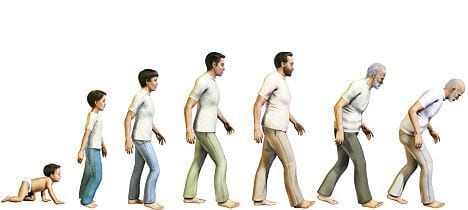At a Faulty Development event recently we had a very interesting session on identity where Shakespeare's As You Like It was quoted to show how people's identity changes over time. As You Like It was on the Intermediate (now Junior) Certificate English syllabus when I sat the exam in 1975 - I remembered nothing from it. I'm sure that like most people, I recognised myself in the seven stages straight away. At first I giggled at this, and then I thought a bit more seriously about it.
 |
| Image source: No Sweat Shakespeare. |
First - what a wonder that William Shakespeare's words are being quoted over 400 years after they were written, and how appropriate they still are. I figure I am at stage 5, at times I feel as if I am pushing stage 6. At stage 5 "man" is middle-aged. He is "wise" and contributes to society, with his "round belly" he enjoys the finer things in life like good food and wine.
Later today I will have my first class of the new academic year with second-year students. I'm guessing that most of them will be in the 19 to 20 age group. To them I will appear old, and I will feel the 36-37 year gap in our ages. I'm probably even older than many of their Dads.
As Michael D. Higgins said during the 2011 Presidential Election: "There's nothing I can do about my age", neither can I. It's interesting that we can be bracketed so easily into an identity, and age is the most obvious manifesto of this. A few years ago I gave up trying to be "young" and "hip" in classes with younger students, and just got on with being me. While age can convey a sense of knowledge and experience, there's no denying that there will be a gap in the classroom stage today that I will do my best to minimise.
For reference - here's Shakepeare's As You Like It (Act 2 Scene 7) where Jaques talks through the "seven ages of man":
All the world's a stage,
And all the men and women merely players;
They have their exits and their entrances,
And one man in his time plays many parts,
His acts being seven ages. At first the infant,
Mewling and puking in the nurse's arms.
Then, the whining school-boy with his satchel
And shining morning face, creeping like snail
Unwillingly to school. And then the lover,
Sighing like furnace, with a woeful ballad
Made to his mistress' eyebrow. Then, a soldier,
Full of strange oaths, and bearded like the pard,
Jealous in honour, sudden, and quick in quarrel,
Seeking the bubble reputation
Even in the cannon's mouth. And then, the justice,
In fair round belly, with a good capon lined,
With eyes severe, and beard of formal cut,
Full of wise saws, and modern instances,
And so he plays his part. The sixth age shifts
Into the lean and slippered pantaloon,
With spectacles on nose and pouch on side,
His youthful hose, well saved, a world too wide
For his shrunk shank, and his big manly voice,
Turning again toward childish treble, pipes
And whistles in his sound. Last scene of all,
That ends this strange eventful history,
Is second childishness and mere oblivion,
Sans teeth, sans eyes, sans taste, sans everything.
Source: "All the World's a Stage" (Wikipedia)
No comments:
Post a Comment